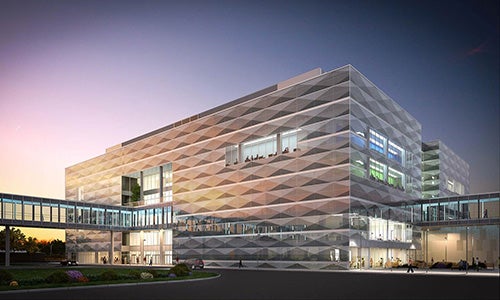
Waterloo approves $88M Engineering 7 building
New building will have some of the best research facilities in the world and support students as they design, build and test their ideas

New building will have some of the best research facilities in the world and support students as they design, build and test their ideas
By Staff Marketing and Strategic Communications
The University of Waterloo’s Board of Governors has approved the construction of a new $88-million Engineering 7 (E7) building.
The 230,000-square-foot, seven-storey building will house Waterloo Engineering’s ongoing transformation of how it delivers education to students.
“As the University of Waterloo continues to emerge as one of the world’s top innovation universities, the construction of E7 will enable us to attract even more of the best and brightest students and faculty who will undertake their studies and research here,” said Feridun Hamdullahpur, president and vice-chancellor of Waterloo. “Nearly 8,500 undergraduate engineering students will engage in experiential education opportunities in E7, which will also provide space for faculty and graduate students to engage in a research portfolio of disruptive technologies.”
E7 will accommodate growth from the recently launched biomedical engineering program and the expansion of the Faculty of Engineering’s highly popular mechatronics engineering program. It will also house the Faculty’s new teaching innovation, the multidisciplinary Engineering Ideas Clinic™, where undergraduate students starting from first year integrate classroom theory with hands-on learning as they design, build, test and refine ideas.
The Conrad Business, Entrepreneurship and Technology Centre will relocate to E7, where Faculty and mentors will offer a new entrepreneurship option. The building will have dedicated study and social spaces for students, lecture halls and entrepreneurial support areas, along with areas for student teams to prototype their Capstone Design projects.
“With the construction of E7, Waterloo Engineering will graduate even more highly sought-after engineers while catalyzing more innovations, inspiring more entrepreneurs and supporting the next wave of high-impact research,” said Pearl Sullivan, dean of the Faculty of Engineering. “E7 is not just a building, the entire design will enable engineering to take our unique educational experience to the next level and realize our vision for educating the engineer of the future.”
E7 will have some of the best research facilities in the world, including an additive manufacturing—or 3D printing—laboratory, and an indoor flight arena for testing autonomous and robotic vehicles. Many graduate students will likely work to advance technologies including the rapidly progressing Internet of Things, infrastructure and develop wearable biomedical devices to monitor human health.
An atrium and elevated pedestrian bridges will link E7 to Engineering 5 and 6. The target start date for construction is Fall 2015.

Read more
Special issue of Waterloo Magazine celebrates women who lead, and explores equity in education and the workplace

Read more
Here are the people and events behind some of this year’s most compelling Waterloo stories

Read more
Discover how Waterloo alumni are driving Canada’s economy with five tech companies making a local and global impact
The University of Waterloo acknowledges that much of our work takes place on the traditional territory of the Neutral, Anishinaabeg, and Haudenosaunee peoples. Our main campus is situated on the Haldimand Tract, the land granted to the Six Nations that includes six miles on each side of the Grand River. Our active work toward reconciliation takes place across our campuses through research, learning, teaching, and community building, and is co-ordinated within the Office of Indigenous Relations.